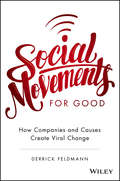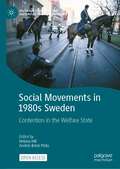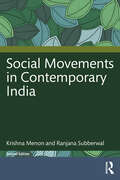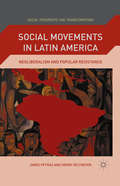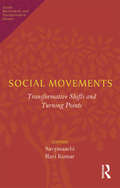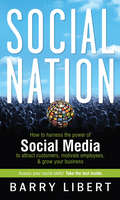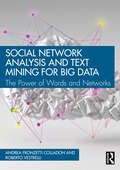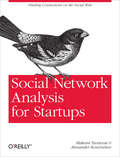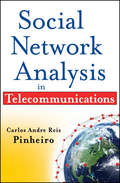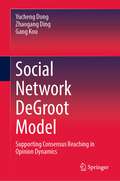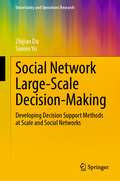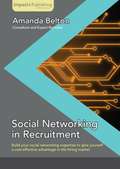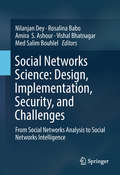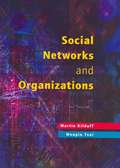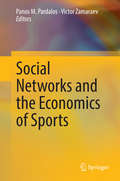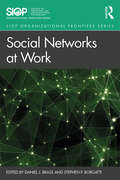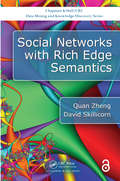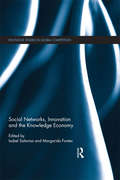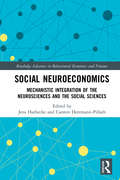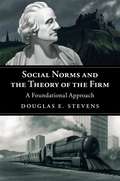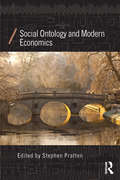- Table View
- List View
Social Movements for Good: How Companies and Causes Create Viral Change
by Derrick FeldmannCreate real change in the new social movement paradigm Social Movements for Good is a guidebook for driving change, by taking advantage of the social "currency" that makes movements go viral. Author Derrick Feldmann has spent a career showing organizations how to best reach donors, activists, and employees, and engage a new generation of supporters. In this book, he shares his secrets alongside the stories of today's most successful social good movements by companies and nonprofits. You'll learn about the leaders behind these movements, the individuals who responded, and the approaches that made it work. Modern social movements operate within a new paradigm, and this informative guide walks you through how these movements are created, why people get on board, and the strategy and support network that must be in place for it to succeed. Just going viral isn't enough to make a movement successful--there must be a plan, and the right people with the right skills to follow through with the execution. This book shows you who you need on your side, what they need to do their jobs, and which tools and methods are proving most effective every day. Read the stories of today's most successful social good movements Understand how modern social movements are created Learn how to truly activate a new generation of activists and supporters Formulate an approach that makes the public respond to your issue Effective social movements don't arise by accident. People don't spontaneously come together and effect real change. If you want your movement to succeed, you need a solid strategy and the tools to follow through. Social Movements for Good is your roadmap to viral success and the advancement of your cause.
Social Movements in 1980s Sweden: Contention in the Welfare State (Palgrave Studies in the History of Social Movements)
by Helena Hill Andrés Brink PintoThis open access book discusses the emergence and development, and in some cases also the disappearance, of social movements and activism in Sweden during the 1980s. Its aim is to nuance and problematize the image of the 1980s as unilaterally dominated by right-wing politics and neoliberalism, as well as the idea of a conflict-free Scandinavian model. The 1980s have often been described as a period when the influence of radical-left movements during the 1970s diminished. Instead, this book argues that the 1980s was a decade in which new radical social movements emerged in opposition to the prevalent political order, including the nuclear disarmament movement, the women's movement, anti-fascist movements, and the punk and environmental movements. The authors also demonstrate how issues such as squatting, nuclear resistance, rent strikes and the environment, included a variety of contentious collective action. Sweden, therefore, presents an interesting example of how resistance and conflict in a strong welfare state have been influenced by contentious social movements. Placing Sweden within the wider context of Scandinavia and Europe, this edited collection makes an important contribution to the history of social movements.
Social Movements in Contemporary India
by Krishna Menon Ranjana SubberwalThis book delves into the concept and definition of social movements from different perspectives with relevance to India. It offers critical insight into the fundamental and ongoing debates and treatises around the struggle for rights and welfare.The book covers discussions on a wide range of movements varying in locus and spatial spread – from movements that highlight environmental issues to those that articulate the voices of women, Dalits, the queer community, persons with disabilities, and farmers. It explores the origins of people’s movements, what a collective is and how communities mobilize and organize. The authors also provide a history of the key social movements in India, examining the social, political, and cultural contexts in which they were born and continue being relevant in contemporary India.This revised and updated edition is an essential volume for students and researchers of social movement studies, sociology, political science and history, protest movements, sociological theory, the history of sociological thought, contemporary social theory, social policy, and international and globalization studies.
Social Movements in Latin America
by Henry Veltmeyer James PetrasThe authors trace out the development of capitalism and U. S. imperialism in Latin America in the latest phase of this development, from the installation of the new world order of neoliberal globalization in the early 1980s to the present when U. S. imperialism is held at bay, neoliberalism is in decline, and capitalism is in crisis.
Social Movements: Transformative Shifts and Turning Points (Social Movements and Transformative Dissent)
by Ravi Kumar SavyasaachiThis volume attempts to show the emerging contours of ‘transformative action’ in social movements across South Asia. It argues that these contours have been shaped by contestations over questions of equity, justice and well-being on the one hand, and the nature and scope of new and classical social movements on the other. This is manifest in diverse modes through people’s struggles, protest and dissent. The authors examine a variety of themes that have determined the course of the politics of transformative struggles. They critique neoliberalism, ‘primitive’ accumulation, money, class inequalities, as well as aspects of capital–labour conflict. They highlight the contributions of movements by women, dalit and marginalized communities; peace movements; and environmental and agrarian struggles. The volume also appraises the role of internet in grassroots mobilizations and that of civil society networks in the making of participatory democracy. It further argues that the predicaments of cultural, ethnic, national, regional, and linguistic identities are not divorced from capital–labour conflicts. The book will serve as essential reading for students and scholars of sociology, social movements, politics, gender and feminist studies, labour studies, and the informed general reader.
Social Murder?: Austerity and Life Expectancy in the UK
by David Walsh Gerry McCartneyLife expectancy is about more than just health – it’s about the kind of society we live in. And in the early 2010s, after decades of continual improvement, life expectancy in the UK, US and many other rich countries stopped increasing. For millions of people, it actually declined. Despite hundreds of thousands of extra deaths, governments and officials remained silent. Combining robust evidence with real-life stories, this book demonstrates how austerity policies caused this scandal. It argues that this shocking and tragic suffering was predictable, caused by a dereliction of duty from those in power. The book concludes with an optimistic vision of what can be done to restore life expectancy improvements and reduce health inequalities.
Social Nation
by Barry D. LibertIt's time to join Social Nation and prosper! This book will show you, as an employee, customer or partner, how to use new social technologies, make yourself heard, and produce better products and services. As a leader and manager, you'll find out how to use these tools to harness social interactions to improve your business and to create your own social nation. The book provides a social assessment for leaders, managers and employees to scientifically evaluate your individual social skills and competencies. This book relies on well-known case studies about businesses that illustrate how social principles and strategies can help organizations to: Integrate social skills into existing managerial and leadership practices Overcome some of the common risks and objections that are often cited as obstacles to becoming a successful social enterprise Adopt new forms of social leadership across the entire organization Attain social intelligence by listening, understanding, and measuring outcomes of your investment in relationships with customers, employees and partners Realize tangible economic benefits and ROI from new product and service offerings Social Nation provides readers with an opportunity to join the Social Nation community and share experiences with other leaders and social individuals.
Social Network Analysis and Text Mining for Big Data: The Power of Words and Networks
by Andrea Fronzetti Colladon Roberto VestrelliSocial Network Analysis and Text Mining for Big Data presents cutting-edge methods and tools that bridge the gap between text mining and social network analysis research while also providing new insights for analyzing (big) textual and network data. These tools are designed to cater to the needs of both business analysts and researchers to facilitate the creation of groundbreaking analytics.Beginning with clear definitions of social network analysis and text mining, this book benefits from a thoughtfully curated selection of methods and tools, drawn from the authors’ extensive research in the field. The focus then shifts to demonstrate how the interplay between words and networks can unlock the full potential of big data analytics. A centerpiece of the book is the Semantic Brand Score (SBS), a versatile and powerful metric for assessing brand importance through text analysis. All of the above is corroborated and illustrated with practical applications and case studies showing the value of these analytics in supporting change and improved managerial decisions. It also introduces a specialized software tool which enables users to perform the analyses detailed in the text.This book is a must-read for business leaders, marketing professionals, policymakers, researchers, and university students. It offers practical insights and actionable advice for achieving increased performance of companies and societal actions. The writing is tailored to make complex concepts accessible to both experienced researchers and readers who are new to the field.
Social Network Analysis for Startups: Finding connections on the social web
by Alexander Kouznetsov Maksim TsvetovatDoes your startup rely on social network analysis? This concise guide provides a statistical framework to help you identify social processes hidden among the tons of data now available.Social network analysis (SNA) is a discipline that predates Facebook and Twitter by 30 years. Through expert SNA researchers, you'll learn concepts and techniques for recognizing patterns in social media, political groups, companies, cultural trends, and interpersonal networks. You'll also learn how to use Python and other open source tools—such as NetworkX, NumPy, and Matplotlib—to gather, analyze, and visualize social data. This book is the perfect marriage between social network theory and practice, and a valuable source of insight and ideas.Discover how internal social networks affect a company’s ability to performFollow terrorists and revolutionaries through the 1998 Khobar Towers bombing, the 9/11 attacks, and the Egyptian uprisingLearn how a single special-interest group can control the outcome of a national electionExamine relationships between companies through investment networks and shared boards of directorsDelve into the anatomy of cultural fads and trends—offline phenomena often mediated by Twitter and Facebook
Social Network Analysis in Telecommunications
by Carlos Andre Reis PinheiroA timely look at effective use of social network analysis within the telecommunications industry to boost customer relationshipsThe key to any successful company is the relationship that it builds with its customers. This book shows how social network analysis, analytics, and marketing knowledge can be combined to create a positive customer experience within the telecommunications industry.Reveals how telecommunications companies can effectively enhance their relationships with customersProvides the groundwork for defining social network analysisDefines the tools that can be used to address social network problems A must-read for any professionals eager to distinguish their products in the marketplace, this book shows you how to get it done right, with social network analysis.
Social Network DeGroot Model: Supporting Consensus Reaching in Opinion Dynamics
by Gang Kou Yucheng Dong Zhaogang DingThis book investigates the DeGroot model in social network contexts, and proposes the social network DeGroot (SNDG) model. Specifically, this book focuses on two core research problems in the SNDG model: (i) Social network structures to reach a stable state (consensus, polarization, or fragmentation); and (ii) the convergence rate to reach a stable state. Furthermore, the authors generalize the SNDG model in an uncertain context, showing the effects of interval opinions on the SNDG model. In this book, the authors also discuss the applications of the SNDG model to support group decision making, including consensus reaching through adding minimum interactions, trust relationships manipulations, and risk control issues in the social network. Apart from theoretical analysis, detailed experimental simulations with real and random data will be applied to validate our research.This book is the first to connect opinion dynamics, social network and group decision making. The resultsreported can help us understand the evolution of public opinions in social network contexts and provide new tools to support consensus reaching in group decision making.
Social Network Large-Scale Decision-Making: Developing Decision Support Methods at Scale and Social Networks (Uncertainty and Operations Research)
by Zhijiao Du Sumin YuThis book focuses on the following three key topics in social network large-scale decision-making: structure-heterogeneous information fusion, clustering analysis with multiple measurement attributes, and consensus building considering trust loss. To address the aggregation and distance measurement of structure-heterogeneous evaluation information, we propose a fusion method based on trust and behavior analysis. Then, two clustering algorithms are put forward, including trust Cop-K-means clustering algorithm and compatibility distance-oriented off-center clustering algorithm. The above clustering algorithms emphasize the similarity of opinions and social relationships as important measurement attributes of clustering. Finally, this book explores the impact of trust loss originating from social relationships on the CRP and develops two consensus-reaching models, namely the improved minimum-cost consensus model that takes into account voluntary trust loss and the punishment-driven consensus-reaching model. Some case studies, a large number of numerical experiments, and comparative analyses are provided in this book to demonstrate the characteristics and advantages of the proposed methods and models. The authors encourage researchers, students, and enterprises engaged in social network analysis, group decision-making, multi-agent collaborative decision-making, and large-scale data processing to pay attention to the proposals presented in this book. After reading this book, the authors expect readers to have a deeper and more comprehensive understanding of social network large-scale decision-making. Inorder to make it more accurate for readers to understand the methods and models presented in this book, the authors strongly recommend that potential readers have a good research foundation in fuzzy soft computing, traditional clustering algorithms, basic mathematics knowledge, and other related preliminaries.
Social Networking in Recruitment
by Amanda BeltonBecome a professional social networking expert and give your organization a cost-effective advantage in the hiring market. Social networks have opened up whole new channels of communication between prospective employees and employers. They provide perfect opportunities to build a strong relationship with potential employees that ensures investment in recruitment is targeted towards a successful, cost effective hire. Social networks also allow an organization to build a strong employer brand that reaches the digital natives of the world, enabling the recruiter to achieve a competitive advantage. Author Bio: Amanda Belton is an IT manager specializing in agile and lean software development. In this instructional guide, Amanda will walk you through the practical steps to building a tailored approach to social networking, making the most of the resources already available within your organization.
Social Networks Science: From Social Networks Analysis to Social Networks Intelligence
by Nilanjan Dey Amira S. Ashour Rosalina Babo Vishal Bhatnagar Med Salim BouhlelThe main target of this book is to raise the awareness about social networking systems design, implementation, security requirements, and approaches. The book entails related issues including computing, engineering, security, management, and organization policy. It interprets the design, implementation and security threats in the social networks and offers some solutions in this concern. It clarifies the authentication concept between servers to identity users. Most of the models that focus on protecting users’ information are also included. This book introduces the Human-Interactive Security Protocols (HISPs) efficiently.Presenting different types of the social networking systems including the internet and mobile devices is one of the main targets of this book. This book includes the social network performance evaluation metrics. It compares various models and approaches used in the design of the social networks. This book includes various applications for the use of the social networks in the healthcare, e-commerce, crisis management, and academic applications. The book provides an extensive background for the development of social network science and its challenges. This book discusses the social networks integration to offer online services, such as instant messaging, email, file sharing, transferring patients’ medical reports/images, location-based recommendations and many other functions. This book provides users, designers, engineers and managers with the valuable knowledge to build a better secured information transfer over the social networks. The book gathers remarkable materials from an international experts’ panel to guide the readers during the analysis, design, implementation and security achievement for the social network systems. In this book, theories, practical guidance, and challenges are included to inspire designers and researchers. The book guides the engineers, designers, and researchers to exploit the intrinsic design of the social network systems.
Social Networks and Natural Resource Management: Uncovering the Social Fabric of Environmental Governance
by Örjan Bodin Christina PrellSocial Network Analysis (SNA), a quantitative approach to the study of social relations, has recently emerged as a key tool for understanding the governance of natural resources. Bringing together contributions from a range of researchers in the field, this is the first book to fully explore the potential applications of SNA in the context of natural resource management. Topics covered include the role of SNA in stakeholder selection; improving fisheries management and conservation; the effect of social network ties on public satisfaction and agrarian communication networks. Numerous case studies link SNA concepts to the theories underlying natural resource governance, such as social learning, adaptive co-management and social movements theory. Reflecting on the challenges and opportunities associated with this evolving field, this is an ideal resource for students and researchers involved in many areas of natural resource management, environmental biology, sustainability science and sociology.
Social Networks and Organizations: Cognition, Personality, Dynamics, And Culture (Structural Analysis In The Social Sciences Ser. #30)
by Martin Kilduff Wenpin Tsai`The authors should be congratulated for not only offering an excellent tour de force of cutting-edge work in social network analysis, but also charting some new possible territories for future organizational research′ - Environment and Planning Social Networks and Organizations provides a compact introduction to major concepts in the area of organizational social networks. The book covers the rudiments of methods, explores major debates, and directs attention to theoretical directions, including a vigorous critique of some taken-for-granted assumptions. The book is aimed at all of those who seek a lucid and lively treatment of social network approaches to organizational research, with a particular emphasis on the neglected area of interpersonal networks in organizations. In this book, Martin Kilduff and Wenpin Tsai offer new insights to those already familiar with network analysis, and motivate those interested in pursuing network research to embark on journeys of discovery. `This book is extremely timely. It provides a wonderful synthesis of the recently burgeoning literature in the area of organizations and social networks. It should be relevant at once for both the experienced network scholar as well as those entering this growing area′ - Ranjay Gulati, Kellogg School of Management, Northwestern University `Martin Kilduff and Wenpin Tsai have done a marvellous job of not only reviewing and integrating the diverse streams of literatures on social networks, but also of showing the enormous potential of this research approach that still lies untapped. Overall, this book will prove to be an invaluable resource for interested graduate students as well as for established scholars in the field′ - Sumantra Ghoshal, Professor of Strategic and International Management, London Business School `Research on social networks is already one of the most vibrant areas of organizational inquiry. How can it possibly become any more so? This book by Kilduff and Tsai opens up many new avenues for network research and theory-building. Whether you′re newly-interested in social networks or a veteran of the topic, you will benefit from Kilduff and Tsai′s marvellous contribution′ - Donald C Hambrick, Smeal College of Business Administration, The Pennsylvania State University
Social Networks and the Economics of Sports
by Panos M. Pardalos Victor ZamaraevThis book presents recent research developments in social networks, economics, management, marketing and optimization applied to sports. The volume will be of interest to students, researchers, managers from sports, policy makers and as well athletes. In particular the book contains research papers and reviews addressing the following issues: social network tools for player selection, movement and pricing in team sports, methods for ranking teams and evaluating players' performance, economics and marketing issues related to sports clubs, techniques for predicting outcomes of sports competitions, optimal strategies in sports, scheduling and managing sports tournaments, optimal referee assignment techniques and the economics and marketing of sports entertainment.
Social Networks at Work (SIOP Organizational Frontiers Series)
by Stephen P. Borgatti Daniel J. BrassSocial Networks at Work provides the latest thinking, from top-notch experts, on social networks as they apply to industrial and organizational (I/O) psychology. Each chapter provides an in-depth review along with discussions of future research and managerial implications of the social network perspective. Altogether, the volume illustrates the importance of adding a social capital perspective to the traditional human capital focus of I/O psychology. The volume is organized into two groups of chapters: the first seven chapters focus on specific network concepts (such as centrality, affect, negative ties, multiplexity, cognition, and structural holes) applied across a variety of topics. The remaining eight chapters focus on common I/O topics (such as personality, creativity, turnover, careers, person–environment fit, employment, teams, and leadership) and examine each from a network perspective, applying a variety of network concepts to the topic. This volume is suited for students and academics interested in applying a social network perspective to their work, as well as for practicing managers. Each topic area provides a useful review and guide for future research, as well as implications for managerial action.
Social Networks with Rich Edge Semantics (Chapman & Hall/CRC Data Mining and Knowledge Discovery Series)
by Quan Zheng David SkillicornSocial Networks with Rich Edge Semantics introduces a new mechanism for representing social networks in which pairwise relationships can be drawn from a range of realistic possibilities, including different types of relationships, different strengths in the directions of a pair, positive and negative relationships, and relationships whose intensities change with time. For each possibility, the book shows how to model the social network using spectral embedding. It also shows how to compose the techniques so that multiple edge semantics can be modeled together, and the modeling techniques are then applied to a range of datasets. Features Introduces the reader to difficulties with current social network analysis, and the need for richer representations of relationships among nodes, including accounting for intensity, direction, type, positive/negative, and changing intensities over time Presents a novel mechanism to allow social networks with qualitatively different kinds of relationships to be described and analyzed Includes extensions to the important technique of spectral embedding, shows that they are mathematically well motivated and proves that their results are appropriate Shows how to exploit embeddings to understand structures within social networks, including subgroups, positional significance, link or edge prediction, consistency of role in different contexts, and net flow of properties through a node Illustrates the use of the approach for real-world problems for online social networks, criminal and drug smuggling networks, and networks where the nodes are themselves groups Suitable for researchers and students in social network research, data science, statistical learning, and related areas, this book will help to provide a deeper understanding of real-world social networks.
Social Networks, Innovation and the Knowledge Economy (Routledge Studies In Global Competition Ser. #60)
by Isabel Salavisa Margarida FontesIn this book, the authors illustrate how social networks can play a very significant role in the technological catch up process in moderate innovative countries. Using an innovative approach to the study of entrepreneurship in knowledge-intensive sectors, the book analyses the role of social networks in the access and deployment of the variety of competences and resources required for the successful creation of knowledge-intensive companies, which has not yet been studied sufficiently in this context.
Social Neuroeconomics: Mechanistic Integration of the Neurosciences and the Social Sciences (Routledge Advances in Behavioural Economics and Finance)
by Jens Harbecke; Carsten Herrmann-PillathNeuroeconomics has emerged as a paradigmatic field where neuroscience and the social sciences are integrated in one analytical and empirical approach. However, the different disciplines involved often only relate to each other via the shared object of research, and less through the constructing of precise models of integrative mechanisms.Social Neuroeconomics explores the potential of philosophical and methodological reflections in the neurosciences and the social sciences to inform those efforts at cross-disciplinary integration, with a special focus on recent contributions to mechanistic explanations. The collected essays are drawn from the fields of neuroscience, psychology, economics, sociology and philosophy, and examine the ways and methods of constructing unified conceptual frameworks that can guide empirical work and hypothesis building. This is demonstrated in a range of applications, particularly regarding finance and consumer behavior. The concept of the ‘social brain’ is also explored; a multilevel framework in which complex analytical categories such as emotions or socially mediated cognitive processes connect neuronal and social phenomena in specific mechanisms that generate behavior.This book addresses a wide audience across the various disciplines, reaching from the neurosciences to the social sciences and philosophy.
Social Norms and the Theory of the Firm: A Foundational Approach
by Douglas E. StevensFor decades, the economic theory of the firm referred to as agency theory has dominated business research and education in the United States. Although agency theory has been influential in accounting, finance, and managerial economics, it lacks informal and nonfinancial controls. Douglas E. Stevens resolves to enhance this theory through the incorporation of social norms. Drawing on historical context related to the firm, the theory of the firm, and social norm theory related to the firm, he demonstrates the importance of social norms in the formation and development of free-market capitalism and the firm. He also describes the latest theoretical, experimental, and archival evidence to exhibit the growing body of research that incorporates social norms into the theory of the firm. These foundations enable Stevens to create a comprehensive roadmap of agency theory that will have strong implications for practice and public policy.
Social Ontology and Modern Economics (Economics as Social Theory)
by Stephen PrattenEconomists increasingly recognise that engagement with social ontology – the study of the basic subject matter and constitution of social reality - can facilitate more relevant analysis. This growing recognition amongst economists of the importance of social ontology is due very considerably to the work of members of the Cambridge Social Ontology Group. This volume brings together important papers by members of this group, some previously unpublished, in a collection that reveals the breadth and vitality of this Cambridge project. It provides a brilliant introduction to the central themes explored, perspectives sustained, insights achieved and how the project is moving forward. An initial set of papers examine how ontology is understood and justified within this Cambridge project and consider how it compares with prominent historical and contemporary alternatives. The majority of the included papers involve social ontological analysis being put to work directly in underlabouring for specific types of development in economics. The papers are grouped according to their contribution to clarifying and developing (i) various competing traditions and projects of modern economics, (ii) history of thought contributions, (iii) methodological concerns, (iv) ethics and (v) conceptions of particular aspects of social reality, including money, gender, technology and institutions. Background to and a brief history of the Cambridge group is provided in the Introduction. Social Ontology and Modern Economics will be of interest not only to economists but also philosophers of social science, social theorists and those eager to explore the nature of gender, social institutions and technology.
Social Organization of Medical Work
by Seymour LipsetToday we face the painful reality of the prevalence of chronic, rather than acute, diseases. The technologies developed to manager long-term, incurable illnesses have radically and irrevocably altered the organizational structure of health care, presenting us with a frequently bewildering array of medical specialties. Social Organization of Medical Work offers essential insight into this new era of health care.Through richly documented, often gripping case studies, Anselm Strauss and his co-authors show us exactly how health workers are confronting the problems created by chronic disease and coping with today's highly technologized hospitals. They guide us through the various hospital work sites, describing in detail the kinds of tasks performed by medical personnel, the interactions of staff members with each other and with patients, and the overall resulting patient treatment and response.Focusing on the concept of illness trajectory, the authors vividly illustrate the complex, contingent nature of modern medical work. For example, open heart surgery keeps ill persons alive and may even improve them symptomatically, but those who do survive must face an uncertain future in terms of the physiological consequences of the surgery and the drugs required. They also have to adjust t altered lifestyles. In the new introduction, Anselm Strauss discusses the continuing importance of this work to sociologists, medical scholars, and medical professionals.
Social Organizations and the Authoritarian State in China
by Timothy HildebrandtReceived wisdom suggests that social organizations (such as non-government organizations, NGOs) have the power to upend the political status quo. However, in many authoritarian contexts, such as China, NGO emergence has not resulted in this expected regime change. In this book, Timothy Hildebrandt shows how NGOs adapt to the changing interests of central and local governments, working in service of the state to address social problems. In doing so, the nature of NGO emergence in China effectively strengthens the state, rather than weakens it. This book offers a groundbreaking comparative analysis of Chinese social organizations across the country in three different issue areas: environmental protection, HIV/AIDS prevention, and gay and lesbian rights. It suggests a new way of thinking about state-society relations in authoritarian countries, one that is distinctly co-dependent in nature: governments require the assistance of NGOs to govern while NGOs need governments to extend political, economic, and personal opportunities to exist.
